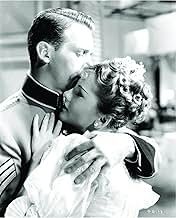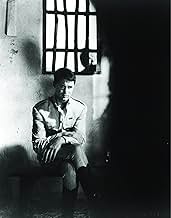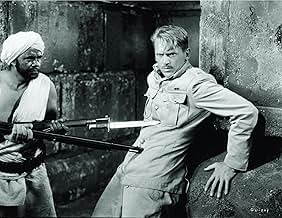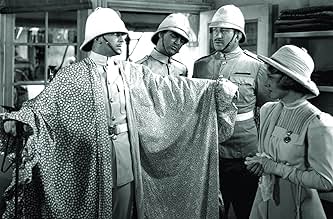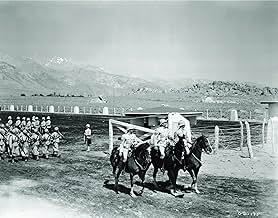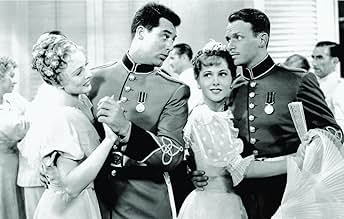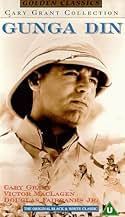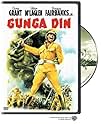VALUTAZIONE IMDb
7,2/10
13.348
LA TUA VALUTAZIONE
Nell'India del XIX secolo, tre soldati britannici e un portatore d'acqua nativo devono fermare il risveglio di massa segreto del culto omicida dei thug prima che possa coinvolgere tutto il t... Leggi tuttoNell'India del XIX secolo, tre soldati britannici e un portatore d'acqua nativo devono fermare il risveglio di massa segreto del culto omicida dei thug prima che possa coinvolgere tutto il territorio.Nell'India del XIX secolo, tre soldati britannici e un portatore d'acqua nativo devono fermare il risveglio di massa segreto del culto omicida dei thug prima che possa coinvolgere tutto il territorio.
- Regia
- Sceneggiatura
- Star
- Premi
- 4 vittorie totali
Charles Bennett
- Telegraph Operator
- (non citato nei titoli originali)
Gene Coogan
- Lancer
- (non citato nei titoli originali)
Jimmy Dime
- Thug
- (non citato nei titoli originali)
George Du Count
- Pandu Lal
- (non citato nei titoli originali)
Anna May the Elephant
- Elephant
- (non citato nei titoli originali)
Recensioni in evidenza
This old film just has some important elements the bulk of current films seem to lack: strength of character, genuine heroism and an understanding of what true altruism and sacrifice mean. And Sam Jaffe, a terrific (now-unfortunately-deceased) character actor breaks the viewer's heart as the "regimental bhisti, Gunga Din," who takes constant abuse and gives his all, including his life, to carry water to the men of the Queen's regiment even in the thick of battle.
Funny, I don't remember it as a comedy, though I think there may have been some spots of humor in it, but then, I was rather young the last time I saw it on the Late, Late Show... too many years ago to even want to think about.
It's a wonderful movie and I hope the animated version, coming out next year, does the poem and story the same good service the 1939 film managed to do.
Highly recommended.
Funny, I don't remember it as a comedy, though I think there may have been some spots of humor in it, but then, I was rather young the last time I saw it on the Late, Late Show... too many years ago to even want to think about.
It's a wonderful movie and I hope the animated version, coming out next year, does the poem and story the same good service the 1939 film managed to do.
Highly recommended.
'Gunga Din' is the kind of film you cherish after the first viewing and then want to revisit from time to time. It stays in the memory and for valid reasons--the casting is perfect with the three buddies entering into the spirit of the whole thing--the perfect buddy movie. Cary Grant gave many fine performances on film but this is one of his greatest--heroic and funny at the same time. Sam Jaffe is excellent as the water carrier who eventually saves the regiment in what has to be one of the most thrilling endings ever conceived for an action movie. Today some of it is politcally incorrect but this is a minor flaw in a great movie. Douglas Fairbanks, Jr., Victor McLaglen and Eduardo Ciannelli are all perfectly cast. Joan Fontaine has a couple of brief scenes as the only femme in the story--but fails to ignite any interest in her bland role. Based on the famous Rudyard Kipling poem, it deserves a place at the top of the list of great adventure films produced in the 1930s. I'd love to see a technicolor version today with someone like Brendan Fraser leading the "musketeers". A real gem.
This movie was one of my favorites when I was growing up, and so when I bought the VHS tape a few months ago I was somewhat apprehensive about watching it again. I thought that maybe my memory of the film was a little sugar coated.
I was; however, pleasantly surprised to find that I still loved watching it as much as I did when I was a kid. It's a great action adventure movie. A previous reviewer commented on the lack of sophistication the movie conveys.
Whoever that guy is, he needs to lighten up. It's hard to look at for example the special effects and cinematography in an action adventure movie such as this when compared to the special effects and cinematography of Crouching Tiger Hidden Dragon. Time's have changed, and movies with them. If you keep that in mind while watching this film, and have a good time with it you'll love this movie.
I would love to see this come out on DVD, it's a great movie.
I was; however, pleasantly surprised to find that I still loved watching it as much as I did when I was a kid. It's a great action adventure movie. A previous reviewer commented on the lack of sophistication the movie conveys.
Whoever that guy is, he needs to lighten up. It's hard to look at for example the special effects and cinematography in an action adventure movie such as this when compared to the special effects and cinematography of Crouching Tiger Hidden Dragon. Time's have changed, and movies with them. If you keep that in mind while watching this film, and have a good time with it you'll love this movie.
I would love to see this come out on DVD, it's a great movie.
For years I thought this knockabout service comedy was a product of John Ford, especially with Victor McLaglen as one of the leads. It certainly has the same rough house humor that Ford laces his films with.
To my surprise I learned it was George Stevens who actually directed it. Still I refuse to believe that this film wasn't offered to John Ford, but he was probably off in Monument Valley making Stagecoach.
Victor McLaglen along with Cary Grant and Douglas Fairbanks, Jr., play three sergeants in the Indian Army who have a nice buddy/buddy/buddy camaraderie going. But the old gang is breaking up because Fairbanks is engaged to marry Joan Fontaine. Not if his two pals can help it, aided and abetted by regimental beastie Gunga Din as played by Sam Jaffe.
The Rudyard Kipling poem served as the inspiration for this RKO film about barracks life in the British Raj. The comic playing of the leads is so good that it does overshadow the incredibly racist message of the film. Not that the makers were racist, but this was the assumption of the British there at the time, including our leads and Gunga Din shows this most effectively.
The British took India by increments, making deals here and there with local rulers under a weak Mogul emperor who was done away with in the middle of the 19th century. They ruled very little of India outright, that would have been impossible. Their rule depended on the native troops you see here. Note that the soldiers cannot rise above the rank of corporal and Gunga Din is considerably lower in status than that.
Note here that the rebels in fact are Hindu, not Moslem. There are as many strains of that religion as there are Christian sects and this strangling cult was quite real. Of course to those being strangled they might not have the same view of them as liberators. But until India organized its independence movement, until the Congress Party came into being, these people were the voice of a free India.
But however you slice it, strangling people isn't a nice thing to do and the British had their point here also. When I watch Gunga Din, I think of Star Trek and the reason the prime directive came into being.
Cary Grant got to play his real cockney self here instead of the urbane Cary we're used to seeing. Fairbanks and McLaglen do very well with roles completely suited to their personalities.
Best acting role in the film however is Eduard Ciannelli as the guru, the head of the strangler cult. Note the fire and passion in his performance, he blows everyone else off the screen when he's on.
Favorite scene in Gunga Din is Ciannelli exhorting his troops in their mountain temple. Note how Stevens progressively darkens the background around Ciannelli until all you see are eyes and teeth like a ghoulish Halloween mask. Haunting, frightening and very effective.
It was right after the action of this film in the late nineteenth century that more and more of the British public started to question the underlying assumptions justifying the Raj. But that's the subject of Gandhi.
Gunga Din is still a great film, entertaining and funny. It should be shown with A Passage to India and Gandhi and you can chart how the Indian independence movement evolved.
To my surprise I learned it was George Stevens who actually directed it. Still I refuse to believe that this film wasn't offered to John Ford, but he was probably off in Monument Valley making Stagecoach.
Victor McLaglen along with Cary Grant and Douglas Fairbanks, Jr., play three sergeants in the Indian Army who have a nice buddy/buddy/buddy camaraderie going. But the old gang is breaking up because Fairbanks is engaged to marry Joan Fontaine. Not if his two pals can help it, aided and abetted by regimental beastie Gunga Din as played by Sam Jaffe.
The Rudyard Kipling poem served as the inspiration for this RKO film about barracks life in the British Raj. The comic playing of the leads is so good that it does overshadow the incredibly racist message of the film. Not that the makers were racist, but this was the assumption of the British there at the time, including our leads and Gunga Din shows this most effectively.
The British took India by increments, making deals here and there with local rulers under a weak Mogul emperor who was done away with in the middle of the 19th century. They ruled very little of India outright, that would have been impossible. Their rule depended on the native troops you see here. Note that the soldiers cannot rise above the rank of corporal and Gunga Din is considerably lower in status than that.
Note here that the rebels in fact are Hindu, not Moslem. There are as many strains of that religion as there are Christian sects and this strangling cult was quite real. Of course to those being strangled they might not have the same view of them as liberators. But until India organized its independence movement, until the Congress Party came into being, these people were the voice of a free India.
But however you slice it, strangling people isn't a nice thing to do and the British had their point here also. When I watch Gunga Din, I think of Star Trek and the reason the prime directive came into being.
Cary Grant got to play his real cockney self here instead of the urbane Cary we're used to seeing. Fairbanks and McLaglen do very well with roles completely suited to their personalities.
Best acting role in the film however is Eduard Ciannelli as the guru, the head of the strangler cult. Note the fire and passion in his performance, he blows everyone else off the screen when he's on.
Favorite scene in Gunga Din is Ciannelli exhorting his troops in their mountain temple. Note how Stevens progressively darkens the background around Ciannelli until all you see are eyes and teeth like a ghoulish Halloween mask. Haunting, frightening and very effective.
It was right after the action of this film in the late nineteenth century that more and more of the British public started to question the underlying assumptions justifying the Raj. But that's the subject of Gandhi.
Gunga Din is still a great film, entertaining and funny. It should be shown with A Passage to India and Gandhi and you can chart how the Indian independence movement evolved.
In the most general of terms Gunga Din not only qualifies as a classic but more or less defines the term "classic" in every respect. I wouldn't know how to fault this film, as it succeeds on every level.
You begin with a workable idea for a story. Then you follow that up with superb script writing, direction and photography, and wonderful performances by the entire cast. The end result of that collaboration of successful effort is, as it must be . . . a classic.
And not only does Gunga Din succeed as a mere action adventure, which would be impressive enough, but it's comedic relief serves as a virtual workshop for aspiring directors who, lamentably today, just don't seem to get that part of the equation in all too many cases--you know, as in movie-making is an art? Or at least it used to be.
There's seems to be a gap in our society's culture when it comes to the enjoyment of art which attempts to communicate on various intellectual levels. I would put this down to dubious education all around if I had to pick just one culprit, but I don't know, maybe that's too simplistic. I experience fear, though, when I read negative comments from viewers of films as rich in various, and to me obvious, qualities as is Gunga Din. All I hear in these cases, at best, is a fundamental lack of artistic appreciation at base.
Well, for these people I imagine that all that's left is to simply go out and buy the cheap remakes of the classic films, which are, of course, a dime a dozen nowadays. And then I suppose they will get what they need: presumably a package of questionable casting, incompetent direction, in many instances virtually no attempt at intelligent character development whatsoever, along with x-many minutes of gratuitous violence and endless smash-ups, replete, of course, with plenty of LFE icing for this new-age filmic cake.
Meanwhile, I hope that my daughter will come to appreciate the great films such as Gunga Din for the classic productions they were upon release, and which they certainly remain today.
You begin with a workable idea for a story. Then you follow that up with superb script writing, direction and photography, and wonderful performances by the entire cast. The end result of that collaboration of successful effort is, as it must be . . . a classic.
And not only does Gunga Din succeed as a mere action adventure, which would be impressive enough, but it's comedic relief serves as a virtual workshop for aspiring directors who, lamentably today, just don't seem to get that part of the equation in all too many cases--you know, as in movie-making is an art? Or at least it used to be.
There's seems to be a gap in our society's culture when it comes to the enjoyment of art which attempts to communicate on various intellectual levels. I would put this down to dubious education all around if I had to pick just one culprit, but I don't know, maybe that's too simplistic. I experience fear, though, when I read negative comments from viewers of films as rich in various, and to me obvious, qualities as is Gunga Din. All I hear in these cases, at best, is a fundamental lack of artistic appreciation at base.
Well, for these people I imagine that all that's left is to simply go out and buy the cheap remakes of the classic films, which are, of course, a dime a dozen nowadays. And then I suppose they will get what they need: presumably a package of questionable casting, incompetent direction, in many instances virtually no attempt at intelligent character development whatsoever, along with x-many minutes of gratuitous violence and endless smash-ups, replete, of course, with plenty of LFE icing for this new-age filmic cake.
Meanwhile, I hope that my daughter will come to appreciate the great films such as Gunga Din for the classic productions they were upon release, and which they certainly remain today.
Lo sapevi?
- QuizThe gong in the title sequence is the same one used to summon King Kong six years earlier.
- BlooperBallantine and MacChesney are bound and gagged when the last Thuggee is about to behead them after Gunga Din sounds the alarm. Cutter shoots the Thuggee and Ballantine and MacChesney are unbound as they rush to Cutter's side.
- Citazioni
Sgt. Thomas 'Tommy' Ballantine: You displease me greatly, and I ignore the both of you.
- Curiosità sui creditiThe credits appear on a gong. Standing next to the gong is a Hindu man, and every time he strikes the gong, the credits change.
- Versioni alternativeGerman theatrical version was cut by approx. 12 minutes. This version was later shown on TV but never released on any home media format. Only in 2018 the film was released on DVD, with approx. 4 minutes restored.
- ConnessioniFeatured in I giovani arrabbiati (1959)
I più visti
Accedi per valutare e creare un elenco di titoli salvati per ottenere consigli personalizzati
- How long is Gunga Din?Powered by Alexa
Dettagli
- Data di uscita
- Paese di origine
- Lingua
- Celebre anche come
- Aufstand in Sidi Hakim
- Luoghi delle riprese
- Azienda produttrice
- Vedi altri crediti dell’azienda su IMDbPro
Botteghino
- Budget
- 1.910.000 USD (previsto)
- Tempo di esecuzione1 ora 57 minuti
- Colore
- Proporzioni
- 1.37 : 1
Contribuisci a questa pagina
Suggerisci una modifica o aggiungi i contenuti mancanti



